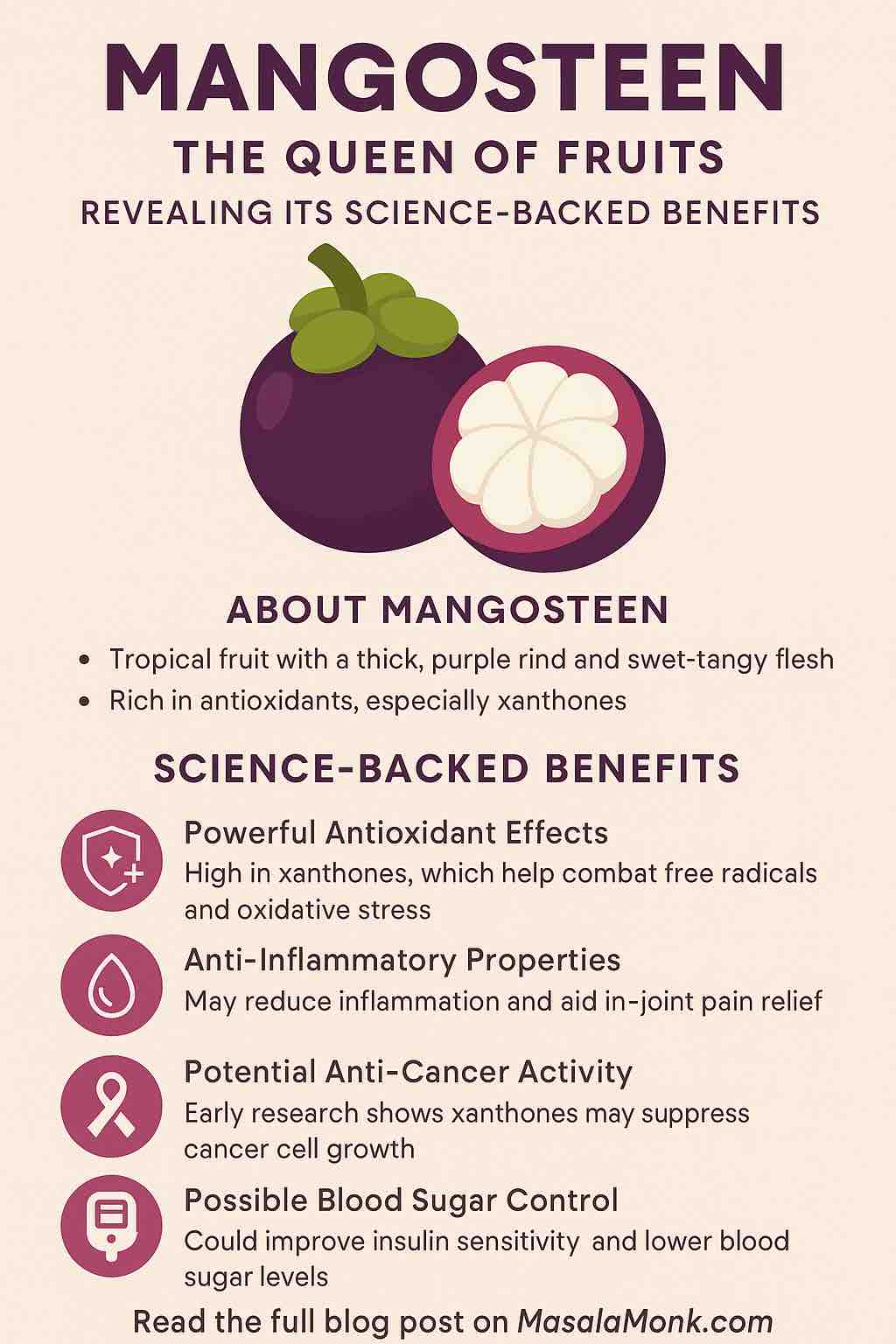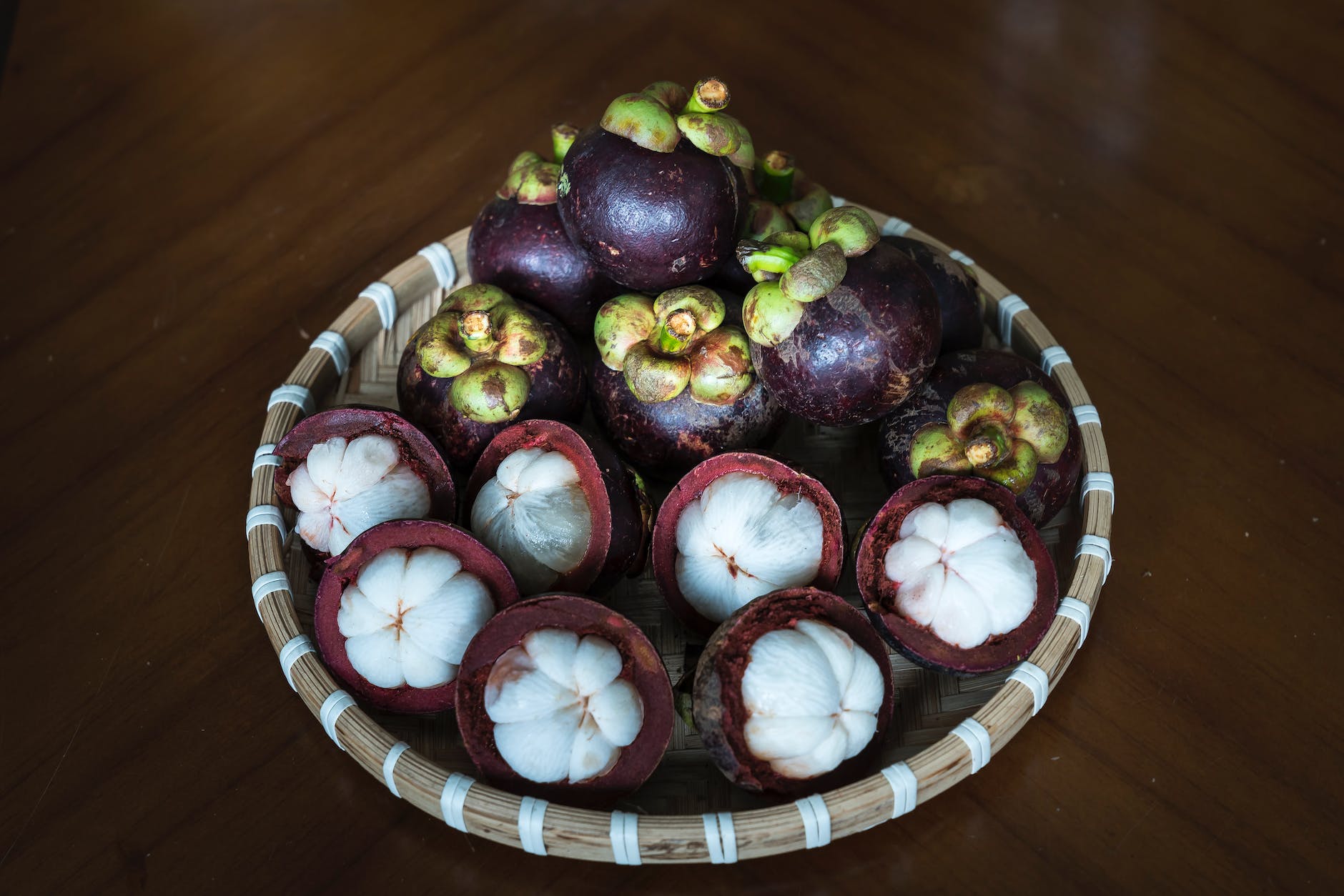
If you’re a fan of superfoods or just curious about exotic fruits with powerful health perks, mangosteen might be one you haven’t fully explored yet. Known as the “queen of fruits,” mangosteen (Garcinia mangostana) has been prized in Southeast Asia for centuries—not only for its delicious, sweet-tangy flavor but increasingly for its potential health-boosting properties.
Today, with a surge in scientific interest, mangosteen is stepping into the spotlight backed by research that reveals exciting benefits you can’t ignore. In this blog, we’ll dive deep into what makes mangosteen so special, the latest studies validating its health powers, and what that means for you.
What is Mangosteen? A Quick Introduction
Mangosteen is a tropical fruit native to Southeast Asia, easily recognized by its thick, purple rind and juicy, fragrant white flesh. While the fruit’s taste is a treat, its rind and pulp are packed with bioactive compounds—especially a unique group called xanthones.
Xanthones are powerful polyphenols that act as antioxidants and anti-inflammatory agents. This is where the magic of mangosteen begins.
The Nutritional and Bioactive Powerhouse
Mangosteen is more than just a tasty fruit. It contains:
- Vitamin C — vital for immune function and skin health
- Dietary fiber — promotes digestion and gut health
- Manganese, magnesium, and potassium — essential minerals for body functions
- Xanthones — unique compounds with antioxidant, anti-inflammatory, and even anticancer properties
Two main xanthones, α-mangostin and γ-mangostin, have been the focus of many recent studies, showing a wide range of biological activities.
Latest Scientific Insights: What Does Research Say?
Recent studies (as of 2024 and 2025) have taken mangosteen from traditional remedy status to a scientifically validated functional food with promising health benefits.
1. Rapid Joint Health Relief
A standout clinical trial revealed that a mangosteen extract supplement, marketed as MangoSoothe, helped reduce joint discomfort significantly—by 50% in older adults and 31% in athletes—within just five days of use. This is remarkable for anyone suffering from joint pain or inflammation, suggesting mangosteen’s anti-inflammatory properties translate quickly to real-world benefits.
2. Powerful Antioxidant and Anti-inflammatory Effects
Oxidative stress and chronic inflammation are at the root of many diseases, from heart disease to neurodegeneration. Mangosteen’s xanthones boost the body’s antioxidant capacity, helping neutralize harmful free radicals. A 2024 study confirmed that daily consumption of mangosteen juice or supplements lowered inflammation markers without adverse effects on liver or kidney health.
3. Promising Anti-Diabetic Potential
Research using diabetic rodent models showed that mangosteen extracts improved insulin sensitivity and helped regulate blood sugar levels. While human clinical trials are still limited, these findings hint at mangosteen’s potential as a complementary aid for metabolic health.
4. Possible Anti-Cancer Properties
Lab studies continue to reveal that α-mangostin may inhibit the growth of cancer cells by inducing apoptosis (programmed cell death). While this is exciting, it’s important to note these are early findings mostly in vitro or in animals. More human trials are needed before any claims can be made.
How Does Mangosteen Work? The Science Behind the Benefits
The secret lies in mangosteen’s bioactive xanthones. These compounds interact with various biological pathways:
- They scavenge free radicals, reducing oxidative damage to cells.
- They modulate inflammatory enzymes and cytokines, dialing down inflammation.
- They influence cell signaling pathways involved in cancer cell growth and survival.
- They may improve glucose metabolism, impacting insulin response.
This multi-targeted approach is why mangosteen can potentially support several aspects of health simultaneously.
How to Incorporate Mangosteen Into Your Diet
- Fresh fruit: Eat mangosteen fresh when in season for maximum nutrients and fiber.
- Juices and smoothies: Mangosteen juice offers a tasty antioxidant boost.
- Supplements: Extracts standardized to xanthones are available but vary in quality. Look for reputable brands and consult a healthcare professional, especially if on medication.
- Powders and teas: These provide convenient options, though bioavailability may differ.
Safety and Considerations
Mangosteen is generally safe when consumed as a fruit or supplement in moderation. However:
- Excessive intake may cause digestive issues or allergic reactions in sensitive individuals.
- Supplements can interact with blood thinners or immunosuppressants — consult your doctor.
- Pregnant and breastfeeding women should seek medical advice before use.
Final Thoughts: Is Mangosteen the Superfruit You Need?
Mangosteen’s reputation as a superfruit is well deserved. Thanks to its rich xanthones and nutrient content, it offers antioxidant, anti-inflammatory, metabolic, and potentially anticancer benefits supported by growing scientific research.
While not a cure-all, incorporating mangosteen into a balanced diet may provide meaningful health support, especially for joint health, immune function, and combating oxidative stress.
If you want to stay ahead in your wellness journey, keeping an eye on emerging mangosteen research and trying this exotic fruit (or its quality supplements) is a smart move.
Have you tried mangosteen before? Share your experience or questions below — I’d love to hear your thoughts!
FAQs about Mangosteen and Its Benefits
1. What is mangosteen and why is it called the “queen of fruits”?
Mangosteen is a tropical fruit native to Southeast Asia, known for its sweet, tangy flavor and thick purple rind. It’s called the “queen of fruits” due to its unique taste and rich nutritional and bioactive compound profile.
2. What are xanthones, and why are they important in mangosteen?
Xanthones are powerful antioxidant polyphenols found mainly in the mangosteen rind. They contribute to the fruit’s anti-inflammatory, antioxidant, and potential anticancer effects.
3. Can mangosteen help with joint pain and inflammation?
Yes, recent clinical trials suggest that mangosteen extracts can reduce joint discomfort and inflammation, showing promising results for both seniors and athletes.
4. Is mangosteen effective for managing blood sugar or diabetes?
Animal studies indicate mangosteen may improve insulin sensitivity and help regulate blood sugar, but more human research is needed before it can be recommended specifically for diabetes management.
5. Are there any known side effects or risks associated with mangosteen?
Mangosteen is generally safe in moderate amounts. However, excessive consumption might cause digestive upset, and supplements could interact with medications like blood thinners. Always consult a healthcare provider if you have concerns.
6. How should I consume mangosteen to get the health benefits?
Fresh mangosteen fruit is best for natural fiber and nutrients. Mangosteen juices, powders, and supplements standardized for xanthones are also options, but quality varies.
7. Can mangosteen help prevent or treat cancer?
Lab and animal studies show mangosteen compounds may inhibit cancer cell growth, but human clinical evidence is insufficient, so it should not replace conventional treatments.
8. Is mangosteen safe during pregnancy or breastfeeding?
There is limited research on mangosteen safety during pregnancy or breastfeeding. It’s best to consult your healthcare provider before use.
9. How quickly can I expect to see benefits from mangosteen supplements?
Some studies report joint health benefits within five days, but results may vary depending on the individual and supplement quality.
10. Where can I buy authentic mangosteen or supplements?
Mangosteen fruit is available in tropical regions and some specialty markets. For supplements, choose reputable brands with standardized xanthone content and third-party testing.










